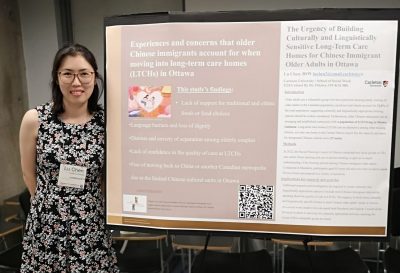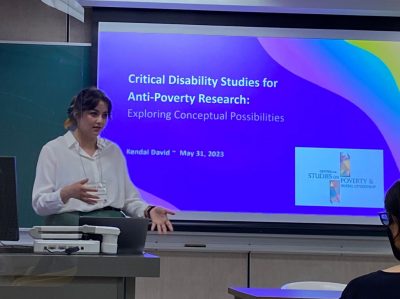Student Conference Support Program Debuts at CASWE 2023
In winter 2023, The Centre for Studies on Poverty and Social Citizenship launched a new initiative, the Student Conference Support Program (SCSP). In line with the Centre’s mission to support critical and innovative Social Work knowledge dissemination, applications opened to any current part-time or full-time Social Work student (BSW, MSW, PhD), or recent grad, whose work has been accepted to a conference.
Conferences are integral meeting places for emerging scholars to contest their ideas publicly, share knowledge, and connect to a wider professional collective. As students may be accepted to a conference, the surrounded costs to attend may be a barrier for some to participate. The purpose of the funds is to assist in covering ancillary costs of attending a conference, such as travel or lodging.
Two students were selected, and presented at the Canadian Association for Social Work Educators (CASWE) annual conference held in Toronto.
Lu Chen – “The Urgency of Building Culturally and Linguistically Sensitive Long-Term Care Homes”

Lu Chen, Social Work student, was selected as a successful candidate for the centre’s Student Conference Support Program. Her poster was selected for CASWE, titled “The Urgency of Building Culturally and Linguistically Sensitive Long-Term Care Homes for Chinese Immigrant Older Adults in Ottawa.”
“…older Chinese immigrants are an emerging and established community with a population of 5,315 living in Ottawa-Gatineau. Long-term care home (LTCH) is an alternative among other housing choices, yet only one home in the Central Ottawa region has the capacity and space (32 units) for designated Chinese cultural units. Given this context, an important research question is what the experiences and considerations are that older Chinese immigrants account for when moving into long-term care homes in Ottawa.” (Chen, L. 2022)
CSPSC spoke to Lu about the experience with the Student Conference Support Program.
CSPSC: How did you find the experience attending the conference?
LC: My experience attending the Canadian Association for Social Work Education (CASWE) at York University was memorable. It was my first time attending such a big conference, so a lot to learn, unlearn, and adjust. I had my poster presentation on the third day of the four-day conference and the topic is, The Urgency of Building Culturally and Linguistically Sensitive Long-Term Care Homes for Chinese Immigrant Older Adult in Ottawa.
CSPSC: How did the SCSP impact your career as a Social Work Student at Carleton?
LC: Surprisingly, it can be expensive to travel to another city for a conference; it never occurred to me until I had my own trip to CASWE, the transportation, accommodation, food, and other expenses. Knowing the existence of SCSP and understanding the ways in which it supports social work students to pursue their research career and/or area of research in the social work field is such a relief, particularly when students struggle with financial stability while in school.
CSPSC: If you attended an abstract development workshop, how did this support you?
LC: I was very grateful that an abstract development workshop was available before I submitted my abstract. As a student who had zero conference experience and was anxious and uncertain about the abstract, I was fortunate to attend one workshop organized by Dr. Redmond. She reviewed my draft and then offered me her valuable input and guidance. But most importantly, her encouragement during the session really boosted my confidence in my work.
CSPSC: How did the conference influence or inform next steps in your career as a researcher with your topic?
LC: Attending CASWE and getting familiar with the Congress have offered me an excellent opportunity to meet different researchers from different backgrounds and get to know their areas of research, which was quite inspiring. Meanwhile, I also felt there were not too many people interested in long-term care homes or immigrant older adults, however, knowing I have my passion for these topics, I think my experience at CASWE will encourage me to continue bringing these discussions to people at other conferences and hope for the best that one day, more people will come to me and ask me questions about long-term cares homes for immigrant older adults.
Kendal David – “Critical Disability Studies for Anti-Poverty Research”
Along with Lu, Social Work PhD student Kendal David was selected for her project “Critical Disability Studies for anti-poverty research: Exploring conceptual possibilities”, which also presented at CASWE.

“…I identify key concepts and insights from this body of knowledge that can meaningfully inform research on income insecurity; namely, I examine the relevance of ableism and debility/capacity for critical social work research in this field. By pulling analytic focus towards ableism, CDS [critical disability studies] offers social work researchers a unique and nuanced way to think about the importance of robust social welfare systems which afford people dignified access to material well-being regardless of their “productive” capacity in a capitalist labour market.” (David, K. 2023).
Kendal spoke with the CSPSC, explaining the experience of attending CASWE, and the value of SCSP.
CSPSC: Why does your area of research benefit from the Student Conference Support Program (SCSP)
KD: My area of research is transdisciplinary, spanning social work, critical disability studies, and critical discourse studies – so being able to engage with other scholars, brainstorm new ideas, and build connections across disciplines is a vital facet of the research process. Despite the benefits of presenting at conferences, travelling to attend them is not without significant expense. As a graduate student, paying for conference fees and the associated travel costs are significant. Receiving support from the SCSP reduced the financial barriers in place for me to attend.
CSPSC: How did you find your experience at the conference?
KD: This was the first time in several years that I have been able to attend a major in-person academic conference. As a second-year PhD student, participating in conferences is an important facet of being engaged in academic culture and life, building my professional network, learning from other scholars, and receiving feedback on my work. It was really impactful to be on campus to connect with peers and colleagues from across the country and to hear about the research that other scholars are working on. Honestly, the late-night conversations in campus dorm rooms with my PhDing friends who also attended the conference (and who are studying at institutions across the country) probably had the biggest influence on my career and research.
Future Opportunities
Applications for SPSC are accepted throughout the year, by any part-time or full-time Carleton Social Work student or recent grad. The purpose of the funds is to assist in covering ancillary costs of attending a conference, such as travel or lodging. Applications can be completed via the CSPSC website here. (https://carleton.ca/cspsc/request-research-support-student-conference-support/). For questions about the program or assistance with application, contact cspsc@carleton.ca.